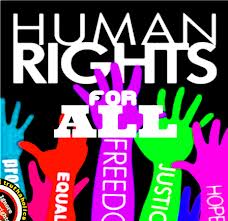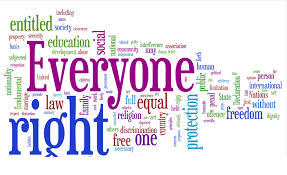
The overall aim of the road show was to ensure that the 16 Days of Activism against Gender Based Violence (GBV) Campaign reached as many towns and people as possible. The total quota for the road show was to ensure that 16 performances took place across Namibia. In total we made visits to Okahandja, Omaruru, Karibib, Usakos, Walvis Bay and Swakopmund, averaging on two to three shows a day. Through a series of five minute skits the actors, namely, Ndino Ndilula, Helouis Gareseb and Gloria Shilongoh, illustrated the plight of those affected by GBV and domestic abuse.
In Okahandja our first show took place at the Ileni Tulikwafeni Centre in 5 Rand. The centre serves as a support group centre for people affected by or living with HIV/AIDS or TB. Some of the people in attendance at our performance at 11h00 were either beneficiaries or volunteers of the group. In total it was a group of about 60 people, mostly women but there was a fair amount of children and youth as well.
The main issue that the actors faced was the language barrier. Many of the audience members were Oshiwambo speaking and what was really amazing and fortunate was that the actors recovered from this setback and reframed the show in Oshiwambo and Afrikaans in order to have the message reach the audience.
The show itself “Gender Stories” recreates several scenarios of gender based violence acts. Many of the audience members seemed to sympathize with the characters and seemed very genuinely grateful that we had taken the time out to come and visit them. The Community Based Care volunteers decided to incorporate the messages that Sister Namibia brought to them into their community outreach programmes and planned to discuss GBV and domestic abuse with their clients during their home visits. Other members also opted to make GBV a focal discussion point in their support groups.
Our next stop was the Okahandja police station where we performed for about 20 police officers. This was also interesting as one of the skits in the play centres around a woman who has been beaten by her husband and goes to the police station to file a complaint where she is met by a very hostile female police officer who is very unhelpful. We were nervous about this as we thought that the officers would be offended, however, they laughed and seemed to recognise the imperfections of the overall system. In attendance at the station were mostly men with about four women in the group, during a particularly violent scene in the play a male police officer shouted out laughing “He must just beat her”, which brings us once again full circle to the idea of sensitivity training for police officers. The question we must ask is how can they protect us if violence is so ingrained in them that it has become normalized and complaining about it ridiculed?
Our third show was in another location of Okahandja called Shetu 3 at a community centre, this show was very low in attendance with mostly women and children. However due to the intimate setting it seemed that the women took the message well and were overall very excited to see such a performance that they had never seen before and we were encouraged to come back.
Our final show in Okahandja was at a charcoal factory the next morning, where we performed for 120 people. It was a combination of both men and women who were all workers at this factory. Oddly enough it was at this performance that it was the men who sympathized with the abused woman in the play even tutting when her mother sends away from her home when she is seeking shelter and asylum from her abusive husband.
Some of the audience shared their personal experiences and told others that we should talk about these issues more often instead of stigmatizing ourselves.

In Omaruru we did two performances one for the police station as well and for a community church group. The police station show in Omaruru was very tricky as the actors had very limited space to perform. They performed in the main complaints office of the police station and it is a true testament to their skill and professionalism that they managed to carry on with the show, whilst people were reporting their stolen cars.
As the road show was a collaborative effort with various Namibian organisations, it was necessary for us to make new contacts in the field. A Sergeant Komaheke from the Omaruru station was very helpful in giving us an opportunity to perform for his church group in the evening to an audience of about a 100 people. This show was very well received, however it was at this point that we became concerned that audiences at this point were not asking any questions at the end of the show nor that they did not feel comfortable in a discussion after the show.
The next stop on our tour was to visit Rehoboth. We arrived in Rehoboth on a busy Saturday morning, where we met up with the Lifeline/Childline team who were our collaborative partners on the campaign. Rehoboth proved to be a bit difficult as one of the venues we had booked had many of the elements, namely the weather, working against us. Therefore we were forced to perform our show in the main street outside of a shopping centre. The audience was intrigued by the show and asked questions afterwards.
The next day we ventured to the coast, performing two shows in Karibib. The first show took place to a mostly female police force at the police station, we thanked for the show and were invited to return to Karibib to bring the message of gender based violence to the local community. With the aid of the Karibib municipality we were able to arrange a second show in Karibib. We performed the second show in the local town hall, to an audience of approximately 60 youths. This proved to be one of the most important show of our tour as it was evident that majority of the young people in attendance were either drunk, or, as we discovered after the show, had had severe experiences with gender based violence. They asked us for more information and also asked for the contact details of Sister Namibia and Lifeline/Childline, which we provided. It was important for us to also provide those who asked hotlines and emergency contact numbers to make complaints and find out more information on gender work in the country. When and where we could we also provided the names and numbers of social workers and shelters.
Our final shows took place at the coast. Our first show at the coast was performed at the DRC (Democratic Resettlement Camp) on the outskirts of Swakopmund. The area is a strong indication of the extent of poverty in Namibia. We performed for an audience of 40 people in a small craft and community centre. The next day we drove to Walvis Bay and performed for the Deputy Commissioner and 50 other police officers. They responded to the material very well and assisted us in getting to our next performance venue, the Kusiebmund Community Centre.
There were performed to a small group of 15 audience members, who also happened to be former sex workers who now work for the SFH (Society for Family Health). They currently do community outreach providing education on sexually transmitted diseases and promised to include the messages on gender based violence in their campaign. After our meeting the decided to form their own support groups in which they would discuss the GBV and issues paramount to the LGBT communities.
Our final show took place in Swakopmund on the steps of the Aquarium to a small audience of 25 people, however as the show progressed passer-by’s would stop to have a look.
All in all it has been very successful and people seem to love that we have come to them directly to spread the message, as opposed to running national campaigns that have often left many communities left out. And this way by being on the ground we have reached a variety of different people and groups.
The importance of the road show was highlighted by the interaction that the audience members had with the material presented to them. Firstly, the road show shed light on the attitude that Namibians have towards GBV and domestic violence. What is concerning is that not only are most audiences unaware of how GBV affects them personally and how it has become normalised in some communities. Another concerning aspect of the reactions we received was the lack of sensitivity displayed by the police officers in various officers in several of the towns we visited. Most police officers would be amused by the skits and refused to contribute to the discussion following the show. However, that is not to say that all of the Namibian police force is inept when it comes to combating GBV. The Walvis Bay Police Force was a shining example of how effective and innovative the police can be when it comes to dealing with the social ills in their community. After the performance the Deputy Commissioner encouraged her police staff to speak up and come up with ideas, in that discussion the police discussed the idea of setting up a GBV hotline, with the number of police superior attached so as to ensure that all complaints are heard. This suggestion came after a point was raised that many victims of GBV or domestic violence are often turned away from the police station when they come to file complaints.
The impact of the show lay in the fact that many of the audiences we had in poorer and peri-urban communities had no idea that such campaigns and organisations existed and therefore were informed on new human rights which they had no knowledge of. The importance of the road show that we were bringing new and vital information to communities that had in the past been overlooked when it comes to international and national campaigns of this kind.
As an interesting side-note we noticed that many towns, especially Karibib, Okahandja and Walvis Bay, there was a strong presence of women, either as the Station Commander, or as the general staff.
Furthermore, it is only through the collaboration with the local town councils, municipalities, police stations, community centres and social activists in the above mentioned areas that this tour was at all possible, therefore they should be thanked and our relationships with them should be nurtured.

Actors (from left) Helouis Gareseb, Gloria Shilongoh and Ndino Ndilula performing the 16 Days of Activism Road Show in Namibia, Dec. 2013.
















